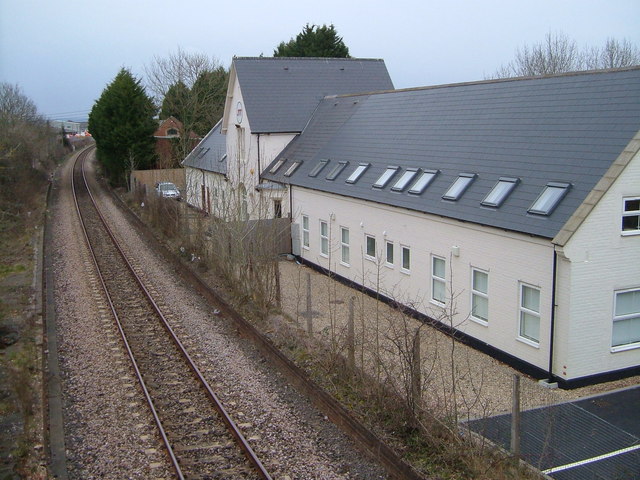Broadclyst Railway Station on:
[Wikipedia]
[Google]
[Amazon]
Broad Clyst railway station is a disused railway station on the
 In 1998 a proposal was discussed in the
In 1998 a proposal was discussed in the House of Commons Hansard Debates for 11 March 1998
/ref> although this has since been changed to " Cranbrook" and so Cranbrook railway station opened in December 2015, approximately 500m from the former Broad Clyst station site in the direction of . The former station building and goods shed remain in commercial use on the Down side. The station building was completely renovated in 2006.
West of England Main Line
The West of England line (also known as the West of England Main Line) is a British railway line from , Hampshire, to in Devon, England. Passenger services run between London Waterloo station and Exeter; the line intersects with the Wessex M ...
which served the nearby village of Broadclyst
Broadclyst is a village and civil parish in the East Devon local government district. It lies approximately 5 miles northeast of the city of Exeter, Devon, England, on the B3181. In 2001 its population was 2,830, reducing at the 2011 Census to 1 ...
from 1860 until its closure in 1966.
History
Constructed by theLondon and South Western Railway
The London and South Western Railway (LSWR, sometimes written L&SWR) was a railway company in England from 1838 to 1922. Originating as the London and Southampton Railway, its network extended to Dorchester and Weymouth, to Salisbury, Exeter ...
to the Gothic
Gothic or Gothics may refer to:
People and languages
*Goths or Gothic people, the ethnonym of a group of East Germanic tribes
**Gothic language, an extinct East Germanic language spoken by the Goths
**Crimean Gothic, the Gothic language spoken b ...
designs of Sir William Tite
Sir William Tite (7 February 179820 April 1873) was an English architect who twice served as President of the Royal Institute of British Architects. He was particularly associated with various London buildings, with railway stations and cemetery ...
, Broad Clyst station was actually more than a mile away from the small village of Broadclyst from which it was to draw most of its traffic. The naming of the station proved to be a source of controversy with the railway company preferring "Broad Clyst" over the Post Office
A post office is a public facility and a retailer that provides mail services, such as accepting letters and parcels, providing post office boxes, and selling postage stamps, packaging, and stationery. Post offices may offer additional serv ...
's insistence that a single word be used. The station attracted residential development in the immediate area and even today the area around the former station is known as Broadclyst Station.
The station saw little change during its 106-year life, it had two short platforms - the Up one was capable of accommodating four carriages and the Down one only three; they were never extended as the station only served local trains. The station was lit by oil lamps until its closure. A small Chief Engineers' depot was located on the Up side and this was extended in 1929 with the laying of additional siding
Siding may refer to:
* Siding (construction), the outer covering or cladding of a house
* Siding (rail)
A siding, in rail terminology, is a low-speed track section distinct from a running line or through route such as a main line, branch l ...
s. At the depot was based a small departmental engine used for shunting operations.
The station saw mainly passenger traffic and goods traffic was fairly light, particularly as there was no resident coal merchant. Nevertheless, from the early 1960s a local manufacturer of three-wheel invalid cars began regularly sending his goods by rail. However, the decision was taken in 1963 to close the engineers' depot and, in 1965, to concentrate goods traffic on Exeter. At the same time, the Broad Clyst station itself was put forward for closure as part of the package of economies proposed by the Beeching Report Beeching is an English surname. Either a derivative of the old English ''bece'', ''bæce'' "stream", hence "dweller by the stream" or of the old English ''bece'' "beech-tree" hence "dweller by the beech tree".''Oxford Dictionary of English Surnames' ...
. Goods traffic ceased in 1965, with passenger traffic ending the following year.
The station today
 In 1998 a proposal was discussed in the
In 1998 a proposal was discussed in the House of Commons
The House of Commons is the name for the elected lower house of the bicameral parliaments of the United Kingdom and Canada. In both of these countries, the Commons holds much more legislative power than the nominally upper house of parliament. ...
to open a station at Broadclyst which would serve a new settlement of 3,000 houses be constructed nearby and to be known as "Clyst Hayes",/ref> although this has since been changed to " Cranbrook" and so Cranbrook railway station opened in December 2015, approximately 500m from the former Broad Clyst station site in the direction of . The former station building and goods shed remain in commercial use on the Down side. The station building was completely renovated in 2006.
References
{{coord, 50.74671, -3.43153, type:railwaystation_region:GB_source:enwiki-osgb36(SX991951), display=title Former London and South Western Railway stations Disused railway stations in Devon Railway stations in Great Britain opened in 1860 Railway stations in Great Britain closed in 1966 Beeching closures in England